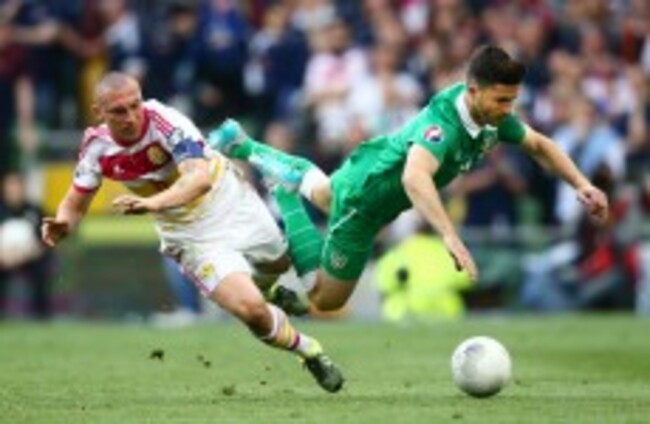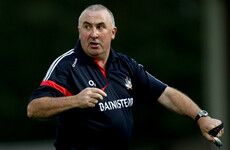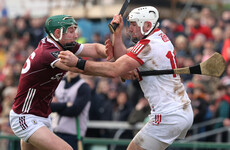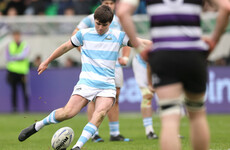1. Adopt a more adventurous approach
IT WOULD BE unfair to suggest that Martin O’Neill has made no brave decisions since taking over as Ireland manager.
The choice to play Robbie Brady at left-back was questioned by some and was by no means an obvious move, and while Brady seemed nervy against Poland last March, at the Aviva Stadium on Saturday, he looked positively more assured and earned a deserved man-of-the-match award.
Yet there is a reason why O’Neill is widely regarded as an innately conservative coach. In what most people were calling a ‘must-win game’ yesterday, he started with three defensive midfielders and a team that was conspicuously light on goal threat owing to the initial absence of the Irish team’s two highest scorers — Shane Long and Robbie Keane.
And granted, O’Neill did start Wes Hoolahan, as many critics had been demanding, but the decision to take the Norwich man off with around 20 minutes to play in order to focus more on route-one football was a regressive move, and Ireland’s attacking impetus unsurprisingly diminished thereafter.
Consequently, the introduction of a more positive, attack-minded midfielder such as Harry Arter, and a greater trust in Hoolahan, could pay dividends in future.
2. Place faith in Shane Long
Despite playing at a higher level than any other striker in the squad and scoring from the bench against Poland, Long continues to be overlooked for a starting spot in the big games.
The Southampton man, who has still only made five competitive starts in eight years as an Ireland international, finished the season in excellent form and thus, yesterday would have been the perfect opportunity to unleash him from the start against the Scots.
Long was eventually brought off the bench, but scarcely had time to influence proceedings in his 10 minutes on the pitch.
That said, Daryl Murphy, to be fair, performed well enough and caused the Scots some problems in the target man role.
However, Long surely also has the requisite physical attributes to lead the line and his pace is something that Murphy can’t offer. Moreover, the Tipperary native’s strengths could also be better utilised away from home, with opposition defences far more likely to play a high line, thereby leaving the 28-year-old striker with space to run into.
3. Learn how to defend tenuous leads
(Shaun Maloney’s deflected goal broke Irish hearts yesterday)
There was a sense of deja vu amid the culmination of yesterday’s game.
Ireland seem perennially destined to draw in big home matches, despite often capitalising on positive starts and taking the lead.
In this campaign, yesterday’s match was the third time Ireland had taken the lead. They also lost their initial advantage against Georgia, while the Gibrtaltar match is relatively insignificant in the general scheme of things.
Furthermore, in their last qualifying attempt prior to the 2014 World Cup, Ireland dropped vital home leads against both Sweden and Austria, badly damaging their hopes of progression in the process. It was a similar story in previous campaigns under Giovanni Trapattoni, when Ireland let their advantage slip in important games against sides such as Italy and Bulgaria.
Consequently, it’s far from a coincidence that Ireland consistently appear to hit the panic button when in a position of strength. This issue must be addressed before the next qualifier and the Boys in Green need to learn how to kill off games more efficiently in order to reach their full potential as a side.
4. Decide on a fixed best team
Martin O’Neill has been in charge for 18 months now, yet it’s obvious that, despite the numerous friendly games and preparatory exercises, he still seems unsure of his best XI.
In the six competitive games under O’Neill’s tenure so far, Ireland have yet to field the same starting side.
Perhaps the Irish management consequently need to make better use of friendly matches. In the past on these occasions, they have appeared reluctant to play a strong team, instead consistently opting to field a decidedly experimental lineup.
However, the Irish team looked desperately short of confidence at times yesterday, and that can partially be attributed to the lack of continuity in O’Neill’s selections.
While there is nothing wrong with making the odd change occasionally, O’Neill should surely at this stage be playing eight or nine of his players on a regular basis if possible, rather than constantly ringing the changes prior to crucial matches.
5. Pray
Even if Ireland manage to overcome the odds and win away in Poland in their final qualifier, they will surely be reliant upon other results going their way, unless they can also pull off a miracle win over world champions Germany.
The fate of the Boys in Green could therefore be in the hands of other teams — Germany getting their act together, Scotland failing to win in Georgia and a stalemate between the Scots and Poland on 8 October would all be potentially beneficial to Ireland’s cause.
However, all this is predicated on the tenuous assumption that Ireland will improve on recent unconvincing displays and finish their campaign strongly.
At the moment, it’s still mathematically possible for Martin O’Neill’s men to qualify, but they may not even have that straw to clutch at for much longer, if the indifferent performances continue in their four remaining Group D fixtures.












all I can say is he’s a brilliant rugby player!